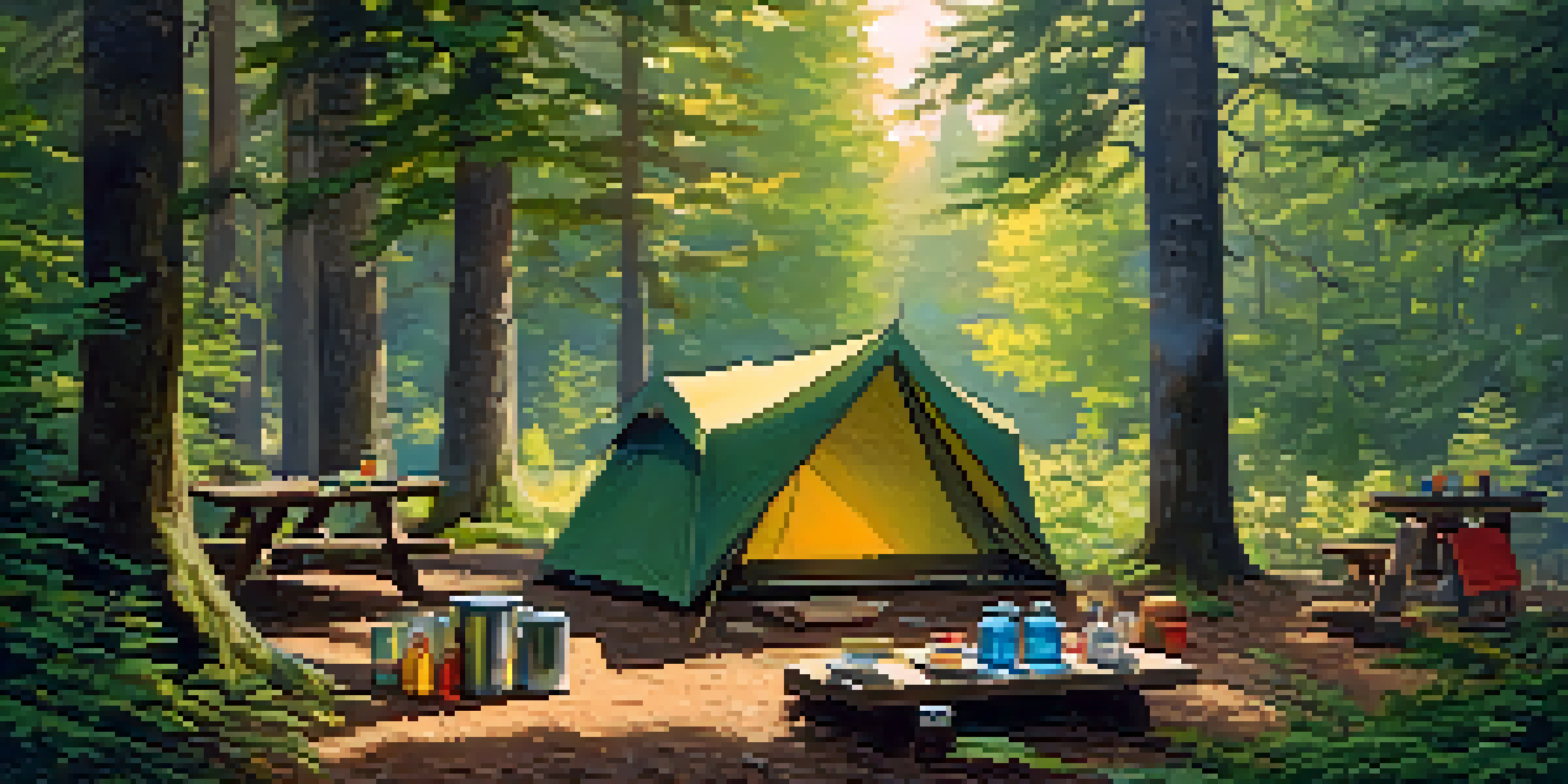Eco-Friendly Camping: Sustainable Practices for Nature Lovers

Understanding the Importance of Eco-Friendly Camping
Eco-friendly camping isn't just a trend; it's a necessary approach to preserving our natural world. By adopting sustainable practices, campers can minimize their impact on the environment, ensuring that beautiful landscapes remain for future generations. Think of it as a way to give back to nature while enjoying its wonders.
The earth does not belong to us: we belong to the earth.
Every choice we make while camping—from the gear we use to the waste we produce—can either harm or help the environment. For instance, choosing biodegradable products and minimizing plastic waste can significantly reduce pollution. This awareness encourages a deeper connection to our surroundings and fosters a sense of responsibility.
Moreover, eco-friendly camping promotes a culture of respect for nature. When we prioritize sustainability, we influence others to do the same, creating a ripple effect. It’s about creating a community of nature lovers who treasure and protect the earth just as much as they enjoy exploring it.
Choosing Sustainable Camping Gear and Equipment
One of the simplest ways to camp sustainably is by selecting eco-friendly gear. Look for products made from recycled materials or those that have a lower carbon footprint. For example, tents made from recycled fabrics not only support sustainability but also often come with great durability.

Additionally, consider the longevity of your equipment. Investing in high-quality gear that lasts for years can reduce the need for frequent replacements, which helps cut down on waste. Just like a good pair of hiking boots can last through many adventures, durable gear serves you well over time.
Sustainable Camping Benefits Nature
Eco-friendly camping practices help preserve the environment and ensure that natural landscapes remain intact for future generations.
Don't forget to pack reusable items, such as water bottles and utensils. This small shift can significantly minimize single-use plastics, which are often found littering beautiful campsites. By opting for sustainable gear, you contribute to a healthier planet while enhancing your camping experience.
Leave No Trace: The Golden Rule of Camping
The Leave No Trace principles are foundational to eco-friendly camping. They remind us that we should leave nature as we found it, or even better. This means packing out everything you bring in and respecting wildlife by not disturbing their habitats.
In every walk with nature one receives far more than he seeks.
For instance, when setting up camp, choose established sites to avoid damaging fragile areas. By sticking to these spots, you help preserve the surrounding ecosystem. It’s like visiting a relative’s house and making sure to keep it tidy; you want to be a good guest in nature’s home.
Moreover, following Leave No Trace guidelines encourages mindfulness about our actions. When we consider how our choices affect the environment, we become more aware campers. This practice fosters a deeper appreciation for nature and reinforces our role as stewards of the earth.
Sustainable Food Practices for Campers
Food is a central part of any camping experience, but it can also be a source of waste. To camp sustainably, plan meals that minimize packaging and food waste. Bulk items, like grains and nuts, can be stored in reusable containers, making meal prep easier and more eco-friendly.
Choosing local and organic foods not only supports local farmers but also reduces your carbon footprint. Imagine cooking a hearty meal with fresh vegetables from a nearby market instead of packaged goods shipped from afar. It’s fresher, tastier, and a great way to connect with the local community.
Choose Eco-Friendly Gear Wisely
Selecting sustainable camping gear, such as products made from recycled materials, can significantly minimize your environmental impact.
Lastly, practice responsible disposal of food scraps. Composting is a fantastic option if you’re staying at a site that allows it. If not, ensure that all food waste is properly packed out. This helps prevent attracting wildlife, which is vital for both their safety and yours.
Water Conservation Tips While Camping
Water is a precious resource, especially in the great outdoors. To conserve water while camping, be mindful of your usage. Simple practices like taking shorter showers or using a sponge bath can make a big difference, especially in remote locations where water may be scarce.
Collecting rainwater for washing or cooking can also be an effective strategy. By setting up a simple system, you can utilize nature’s gift while minimizing your reliance on nearby water sources. Just like we learn to catch rain in buckets at home, the same principle applies in the wild.
Additionally, always be cautious about how you dispose of wastewater. Use biodegradable soaps and filter water before discarding any remnants. This ensures you’re not contaminating local water sources, keeping the ecosystem healthy and vibrant.
Respecting Wildlife: Observing from a Distance
Wildlife encounters can be one of the most thrilling parts of camping. However, respecting animals and their habitats is crucial for their well-being and ours. Always observe wildlife from a safe distance, using binoculars or a camera to appreciate their beauty without intruding.
Feeding wildlife is a big no-no. It disrupts their natural foraging habits and can lead to dangerous situations for both wildlife and campers. Imagine if someone kept offering you snacks; it would be hard to resist, right? Animals can become reliant on human food, which is harmful in the long run.
Respect Wildlife and Their Habitats
Observing wildlife from a distance and avoiding feeding them helps maintain their natural behaviors and supports a healthy ecosystem.
By maintaining a respectful distance and not feeding animals, we allow them to thrive in their natural environment. This fosters a healthier ecosystem and enhances our camping experience, as we get to witness nature's balance without interference.
Building Community: Connecting with Fellow Campers
Camping is a wonderful opportunity to connect with others who share a love for nature. By participating in eco-friendly camping groups or events, you can learn sustainable practices while sharing your own experiences. It’s like joining a book club, but instead of discussing novels, you’re exploring the great outdoors together.
These communities often organize clean-up events, educational workshops, and group hikes, fostering a sense of camaraderie. Engaging with like-minded individuals not only enhances your camping experience but also strengthens your commitment to sustainability. It’s a great way to inspire each other to adopt greener habits.

Moreover, sharing stories and tips can lead to new friendships and unforgettable memories. In the end, it’s about creating a network of nature lovers who are passionate about preserving the environment for future generations.